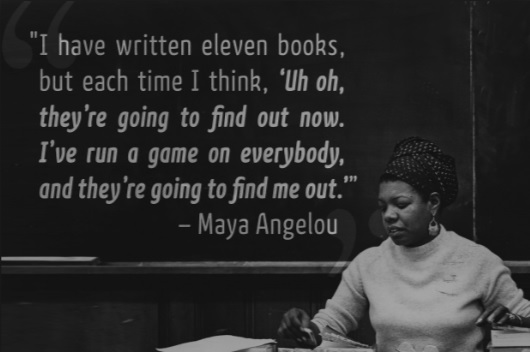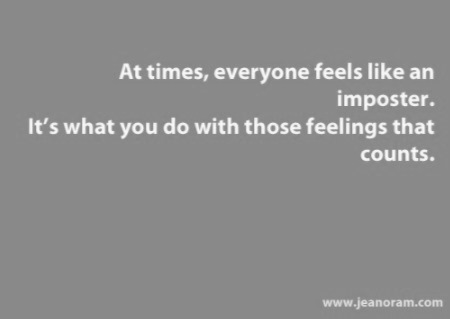In the April issue of Poets & Writers, Leigh Stein wrote a piece called “Poet, Writer, Imposter” that had me nodding along vigorously.
She starts:
“To begin with, my credentials are worthless. I’m no expert. A better writer should have gotten this assignment. My editor is ignoring my e-mails because my work is unpublishable and she’s just trying to find the nicest way to tell me. I’m not that talented. I’ve just been lucky, and what will I do when that luck runs out?
Does any of this interior monologue sound familiar? If so, you may be suffering from impostor phenomenon, which is the name for those sneaky feelings of inadequacy despite actual evidence of professional success.”
Ok, so, are there meetings for people with this issue? Because I will raise my hand with gusto and say, “My name is Kim Hooper. And I suffer from impostor phenomenon.”
The launch of People Who Knew Me has been incredibly surreal. I’ve been more emotional than I expected I would be. People have been so supportive and enthusiastic, saying things like, “We’re so proud of you” and “This is such an achievement.” And I keep thinking, “It’s not that big of an achievement. It’s just a book. Lots of people write books. Have you been in Barnes & Noble? There are, like, a million of them. I just got lucky to be in some Barnes & Noble stores. I’m not even in all of them.”
Then I go and read some of the more negative reviews on Amazon or Goodreads, as a masochistic way of convincing myself that the aforementioned thought process is valid.
What the heck is this about?
In her piece, Stein talks to Sherry Amatenstein, a licensed clinical social worker and author. Amatenstein says, “the whole process of writing is so fraught because unfortunately it is so much about what other people think.” Then: “Artists are always waiting for the next rejection, or the next person to like them.”
Incidentally, the May/June issue of Psychology Today also had a piece on this topic–“Captives of the Mind” by David Kessler.
Kessler hones in on David Foster Wallace and his suicide in 2008 at the age of 46. He writes:
“Contradictory impulses–yearning for greatness yet feeling like a fake with every new achievement–pushed him further into himself…Wallace was haunted by the ‘fraudulence complex,’ as he called it… As an adult, he was always on high alert, sensitive to signs of the beguiling impostor that, though he must have known exists in all of us, he could not allow for himself.”
“Any number of things could threaten his sense of credibility: critical praise, academic success, romantic attention, somebody laughing at his jokes. These were all land mines and, prompted by them, Wallace felt an immediate split between how he was perceived and who he really was. In such moments, his life became a lonely performance.”
Steve Bunney, professor emeritus of psychiatry at Yale, pointed out that “it’s not uncommon for successful people from all walks of life to feel a similar kind of distress. Research has shown that highly accomplished people often report the feeling of being a fraud. Many successful people grow concerned, as Wallace did, that if people really knew them, they’d realize they weren’t deserving of their achievements.”
How ironic that it’s the most successful people who feel least so. In any case, it’s comforting to know that this is a common issue. I’ve talked to co-workers at my ad agency who echo a similar sentiment (eg, “One of these days, someone’s going to find out I don’t know what the hell I’m doing”). Maybe this type of complex is what drives people to produce better and better books/paintings/whatever (and, sometimes, drives them crazy, simultaneously). It’s like they’re thinking, “That other success was fraudulent, but this next one will be (and feel) real.” Chasing the proverbial dragon, as they say.
It seems unlikely that creative people can stop feeling this way. But I think the key is continuing to do what we do despite feeling this way.
This is all new to me. It’s overwhelming. I feel extremely self-conscious and vulnerable with my book “out there,” subjected to opinions (positive and negative). There is just so much chatter now, thanks to the Internet and social media. I’m constantly questioning praise, instead of basking in it. I may never feel comfortable basking in it, but I will enjoy a few celebratory glasses of champagne and keep writing, no matter what.


